Scans
Transcripted by us
THE COP AND THE KILLER
The hit drama is as controversial as it is popular. So why are star Gillian Anderson and writer Allan Cubitt so tetchy? - The RT Interview by Ginny Dougary
Allan Cubitt, the writer of The Fall - BBC2's highest-rating drama launch in eight years - arrives first, early for our interview. He is a slightly rumpled looking man, with kind brown eyes. Next is Gillian Anderson, aka DSI Stella Gibson, tiny and chic in high heels, her manner immediately friendly and later quite fierce.
The synopsis of The Fall is this: serial killer Paul Spector, played by Jamie Dornan, is on the loose in Belfast. He is alarming for all sorts of reasons other than the fact that he kills young professional women. He is extremely good looking (who wants to fancy a serial killer?), seemingly a loving father to two small children, a considerate husband, and works in the utimate of caring professions as a bereavement counsellor.
This element was partly drawn from the author Ann Rule's experience of working alongside the American serial killer Ted Bundy at a suicide helpline, and being impressed by his compassionate manner. "The idea that the bereavement counsellor is gaining, in some way, a weird emotional succour from other people's grief," as Cubitt says, "it very disturbing."
The cleverness of the writing is that Gibson is also somewhat disturbing, as well as a compelling character. Initially, she comes across as coldly self-contained, only occasionally revealing glimpses of a more empathic person. As Anderson said after the screening of a season two's first episode: "She doesn't reveal much about herself, so the little bits she does feel quite large." Early on, Gibson invites a colleague (whom she hasn't actually met but spies on the street) to her room for sex: he is married, and later shot dead.
Parallels are drawn between her objectification of a man she is attracted to, and the way women are often objectified by men - at its most extreme, by a killer such as Spector. Comparisons are also drawn between the growing twin obsessions of the killer and the woman who is determined to track him down. At the end of season one, Spector is on the run. Season two opens with his return and the threat of more murders.
Although The Fall's reviewers were generally as enthralled by the series as its three million viewers, it also came under attack for supposedly glamourising violence against women. At the preview, Cubitt said: "One paper said it was the most disgusting drama ever seen on television, but I don't see how that can be supported."
He referred, as an example, to The Returned, the 2013 French drama in which woman is stabbed in an underpass, and her internal organs then eaten by the killer: "I don't see how anything in The Fall compares to that."
The relaxed atmosphere of the interview tightens when I say - although I am definitely a fan of The Fall and I can't wait for the next season - that I do, at least, understand why some viewers have a problem with the way Spector lays out his victims. The gentle attendance to the corpse; the careful, even arthistic, positioning of her on the bed is almost more creepy than the murder.
Anderson cannot see this viewpoint at all. "From my perspective, he's posing these women as if they are posing for him - in seduction. It's not a fashion magazine shoot type thing. It is what turns him on."
"This is the third interview I've done where it's been referred to as glossy anf glamorous and that is so far removed from what was intended."
But, Gillian, I think this is because the way he stages his victims really does look like some kind of art-directed tableaux. Cubitt responds: "If that is the case. that would be a failure in direction..."
Anderson: "But they don't actually. I really want to make this clear. They actually don't." But isn't it all to do with how the viewer responds? Cubitt: "If that's the way you see them, that's the way you see them."
Later, after Anderson's departure, Cubitt suggests that the art direction interpretation is, in fact, close to what he had been intending. It's part of Spector's aspirations towards intellectual thought, his quoting of Nietzche, his horrible "murder" notebook - full of observations and drawings: "There is the sense that he is being creative [with his victims] in some way. The idea that he thinks he is creating some kind of art installation."
But that is exactly what disturbs people. "I didn't direct the first season, so..." Cubitt says, with unexpected frankness. The first season was directed by Jakob Verbruggen, but as well as writing season two Cubitt will also be directing all six episodes. Does he think it will have a very different quality because of that? "It's bound to have." Are there things you would have done differently? "There are many, many things I would have done differently. I mean, I was very involved with the editing, but you work with the material you've got." Could you give me some examples? Pause. "It may be that the camera lingered too intimately on certain things..."
Another flashpoint with both Cubitt and Anderson, who is executive producer on this second season, is how much the writer intends to explain why Spector is the way he is. "There are two things I'd say about that," Cubitt says, "One, is that we never know why people do the things they do. And, two, you don't know why you do the things you do, either."
Oh God, you're not trying to tell me that we never discover why Spector is such a twisted individual?
"What I'm saying is that there is a portion of ourselves that remains unknowable to other people and, indeed, ourselves..." Stop being such a tease! Will we ever know why?
Anderson jumps in: "But why do we need to know so much about somebody? The simplicity and sparseness [of the script] is what is pulling us forward and is so intriguing, but it's almost as though we can't take it at face value. But the reason why it's as good as it is is because you don't have all that stuff slapped on all the time."
It's fine at the beginning, but if we don't get something of that towards the end, we are definitely going to feel cheated. Anderson: "But why?" Cubitt: "You'll have to wait and see whether you feel cheated or not." Anderson, again: "Yes, yes... but why?"
I say that we are all so used in the post Freud era to analysing people - their motives, what it is about their past that informs their present - and, frankly, it would mean that the viewer wasn't engaged in the drama, if they had no curiosity about why the killer kills and why he is driven to do it in the way he does. This much seems obvious. It's a difficult balance, isn't it, as creator? You have to give the audience just enough...
"I don't want people to feel profoundly unsatisfied," Cubitt says. Are we going to learn anything in this series about Spector's upbringing? "It would be odd if we didn't, wouldn't it? Nobody who comes from a happy childhood ends up doing those things." The abandoned house, with mannequin - is it going to feature in season two? Cubitt: "If I tell you, you can't tell anyone else..." I think that's my answer!
(...)
Scans: FiftyShadesFan

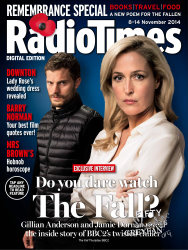
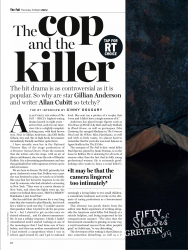
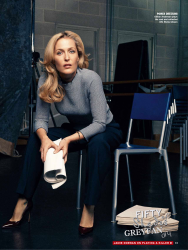
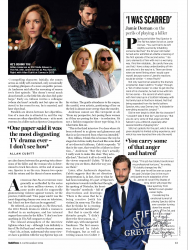
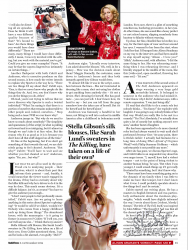
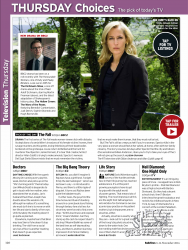
No comments:
Post a Comment